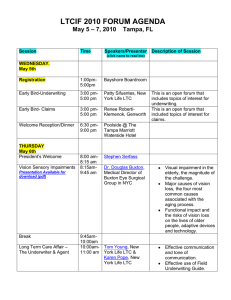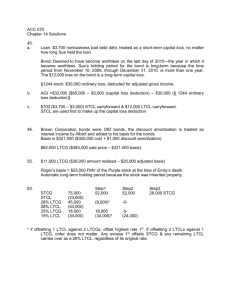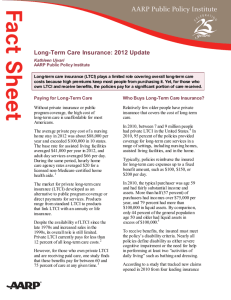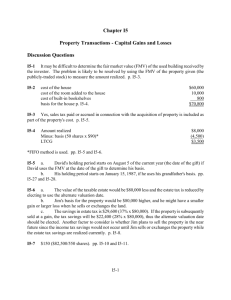Cancer Claims in Long Term Care Insurance Should we be concerned?
advertisement
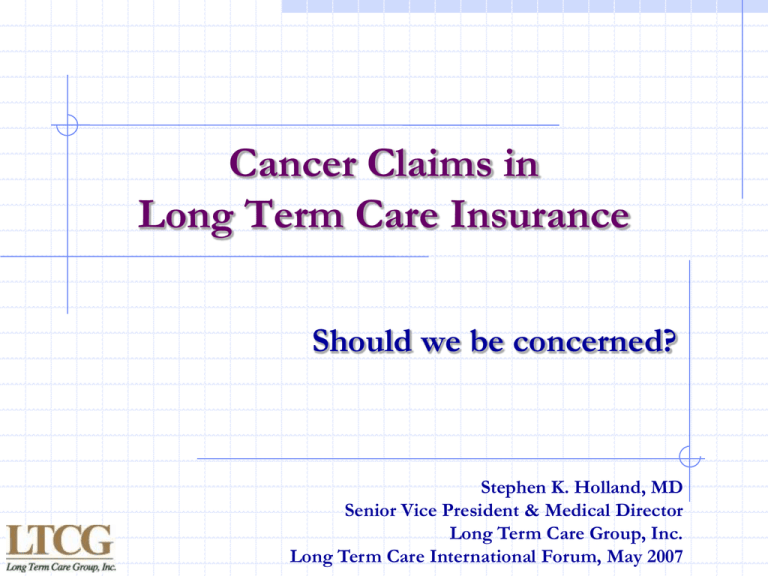
Cancer Claims in Long Term Care Insurance Should we be concerned? Stephen K. Holland, MD Senior Vice President & Medical Director Long Term Care Group, Inc. Long Term Care International Forum, May 2007 LTCI Cancer Claims - Should we be Concerned? Agenda Amen to underwriting How common are LTCI Cancer claims? Compression of Morbidity Claims experience Can Cancer Claims be managed? Conclusions Cancer Claims in Long Term Care Insurance Cancer can be Successfully Underwritten History of Cancer as a LTCI Risk Factor Cancer Claims per 1000 Covered Months Underwritten 0.45 0.4 0.35 0.3 0.25 0.2 0.15 0.1 0.05 0 All Claims LTCG Claims Experience: Cancer All Claims w/ Cancer at UW Cancer Claims w/ history of Cancer Based upon 12 years of Claims Experience History of Cancer as a LTCI Risk Factor Cancer Claims per 1000 Covered Months Underwritten 1.20 1.00 0.80 0.60 0.40 0.20 0.00 All Claims w/ Cancer Claims All Claims w/ Cancer Claims history of w/ Breast CA history of w/ Prostate Breast Cancer at UW Prostate CA at UW Cancer LTCG Claims Experience: Cancer Based upon 12 years of Claims Experience Cancer Claims in Long Term Care Insurance Cancer will be a Common Claimed Event Cancer Incidence Rates*, All Sites Combined All Races, 1975-2002 700 Rate Per 100,000 Men 600 Both Sexes 500 400 Women 300 200 100 0 1975 1978 1981 1984 1987 1990 1993 1996 1999 2002 *Age-adjusted to the 2000 US standard population and adjusted for delay in reporting. Source: Surveillance, Epidemiology, and End Results Program, 1973-2002, Division of Cancer Control and Population Sciences, National Cancer Institute, 2005. Leading Causes of Death: Both Sexes (United States: 2004) 1,000,000 All Ages 900,000 CLR 800,000 Cancer 700,000 Deaths Alzheimer <85 Other CVD 600,000 Stroke 500,000 Heart Disease 400,000 300,000 85+ 200,000 100,000 - Source: NCHS and NHLBI 2004 Cancer and Disability Overall cost of Cancer: $206.3 billion $72.9 billion for direct medical care $17.9 billion in lost productivity due to illness $110.2 billion in lost productivity due to death Greater recovery – return to work after LT disability Breast cancer: 14% increase Colon cancer: 24% increase Prostate Cancer: 36% increase Cancer and Disability UNUM Long Term Disability Claims 1. Cancer 12.1% 2. Complications of pregnancy 11.7% 3. Joint/muscle/connective tissue 10.1% 4. Back Injuries 8.1% 5. Cardiovascular disease 8.0% Unum Corporate Disability Data Base, 2006 Carrier A LTCI Claims Experience (60,000+ Insureds) Most frequent paid claimed events* 1. Dementia, Cognitive Impairment 2. Cancer 3. Cardiovascular, CHF, Stroke, etc. 4. Neurological Disorders 5. Musculoskeletal Disorders 6. Fractures 7. Respiratory disease 8. Trauma 32.5% 21.1% 16.0% 8.9% 6.8% 4.6% 3.0% 2.5% *Accounts for 95.4% of Paid Claims Carrier A LTCI Claims Data Base 4/2007 Carrier A LTCI Claims Experience Average Paid per Claim 1. Dementia, Cognitive Impairment 2. Respiratory disease 3. Cardiovascular, CHF, Stroke, etc. 4. Neurological Disorders 5. Trauma 6. Musculoskeletal Disorders 7. Fractures 8. Cancer $53,153 $31,037 $28,517 $27,960 $21,075 $8,308 $8,775 $6,714 Carrier A LTCI Claims Data Base 4/30/2007 Cancer Claims in Long Term Care Insurance Compression of Morbidity The Emerging Need for Long-Term Care Increasing Life Expectancy 82 80 77.4 78 76 74 73.1 72 70 70 66.6 68 66 65.2 64 60.8 62 60 1940 1960 78.8 1980 Female Source: U.S. Census Bureau 79.5 71.8 1990 Male 74.1 2000 80.7 74.9 2005 Compression of Morbidity (Disability) Present Disability Live longer, same onset morbidity Live longer, delayed morbidity COMPRESSION OF MORBIDITY Life is longer, morbidity compressed After Fries; Ann Intern Med. 2003. 139(5):456 Compression of Morbidity Definition: As life expectancy increases there is a relative decrease in the number of years of disability at the end of life. That is, as life expectancy increases there is a corresponding decrease in overall lifetime disability. Conundrum of Underwriting Community experience without underwriting What is the Effect of LTCI Underwriting? Life is longer, morbidity compressed CANCER Less mortality, shorter duration of disability Live longer, delayed morbidity CAD Less mortality, no effect on duration of disability Live longer, same onset morbidity OA, RA Less mortality, longer duration of disability Compression of Morbidity: Drivers Improvement in lifestyles – smoking, diet, exercise Aggressive treatment of cardiovascular disease Lipids, hypertension, diabetes PTCA, CABG, valve replacement Rate control, stroke prophylaxis, LV function (pacemakers) Medications designed to lessen effects of osteoporosis Arthritis – joint replacement, remitting medication Dementia – new medications (potential cure?) Advances in treatment of infectious hepatitis, multiple sclerosis and spinal cord injuries; immunizations Advances in the Treatment of Cancer Cancer survivors Significant advances in chemotherapy and surgery More remissions, longer remissions Common at time of underwriting (21% of applicants >65 yrs) Potential positive impact on future LTCI claims? Fewer cancer claims, claimants older at time of claim Recurrent cancer embodies compression of morbidity Long term effects of treatment unknown Cancer Claims in Long Term Care Insurance Understanding LTCI Claims Experience LTCG Claims Data Base Risk Pool: >240,000 insureds TQ Group and Individual, Comprehensive, 90 day EP LTC Claims: >9,780 Approved LTCI Claims $344 million benefits paid, >$8 million/month 43% paid for dementia and stroke Disability profile 25% Cognitive Impairment (CI) 45% 2+ ADL deficits 30% Combined ADL & CI LTCG Claims Data Base 4/2007 LTCG Claims Experience As of 4/2007: 9,786 Approved LTCI Claims 1,836 Cancer claims Age at issue: 66.6 years Age at time of claims: 72.5 years $14,532,093 paid to date $3,750 average claim payment 7,950 Claims other than cancer Cancer 18.8% Other than Cancer 81.2% Age at issue: 71.1 years Age at time of claims: 77.6 years $318,918,398 paid to date $54,054 average claim payment LTCG Claims Data Base 2007 LTCG Claims Experience Most frequent paid claimed events* Dementia, Cognitive Impairment 2. Cancer 3. Stroke with complications 4. Fractures/Injuries/Falls/Gait problems 5. Arthritic diseases 6. Parkinson’s disease 7. Respiratory disease 8. CHF, Cardiomyopathy 9. Back disorders 10. Diabetic complications 1. 24.8% 18.8% 10.8% 9.3% 4.4% 4.1% 3.9% 3.1% 2.7% 1.8% *Accounts for 84.6% of Paid Claims LTCG Claims Data Base 2007 LTCG Claims Experience Top Claimed Events 1. Dementia 2. Cancer 3. Stroke 4. Arthritis 5. Fractures/Injuries 6. Respiratory disease 7. Joint replacement 8. Parkinson’s disease 9. CHF, Cardiomyopathy 10. Diabetic complications Top Average Payments Stroke Dementia Falls/gait abnormalities Osteoporosis ALS Cardiac disorders Other CNS disorders Joint replacement Parkinson’s disease Failed back surgery LTCG Claims Data Base - 2007 LTCG Average Claim Payment (Underwritten) Principal Disabling Diagnosis Avg Payment/Claim 1. Stroke $62,298 2. Dementia $60,108 3. Parkinson’s disease $58,121 4. Other CNS disorders $52,544 5. Back Disorders $45,937 6. Falls/Fractures/Gait Abnormalities $45,190 7. Fractures/Injuries $44,733 8. Arthritic diseases $44,660 ...... ..... 27. Cancer $3,750 LTCG Claims Data Base 2007 LTCG Total Claims Payment Claimed Events* 1. Dementia 2. Stroke with complications 3. Fractures/Injuries 4. Parkinson’s disease 5. Arthritic diseases 6. All Cancers 7. Respiratory diseases 8. Back Disorders 9. CHF, Cardiomyopathy 10. Diabetic complications LTCG Claims Data Base 2007 Total Payments $96,967,844 $45,564,461 $28,150,444 $18,832,667 $15,733,965 $14,532,093 $10,556,817 $ 9,616,564 $ 8,137,643 $ 5,509,566 *Accounts for 75% of total claims payments LTCG Cancer Claims Experience Age Distribution 80% Cancer versus All Other Diagnoses Cancer Claims Non Cancer 70% 60% 50% 40% 30% 20% 10% 0% 0-49 years 50-64 years 65-85 years 85+ years Based upon the 12th year of exposure LTCI Cancer Claims Distribution by Type of Tumor GI Tract Lung & Bronchus Lymphoma, Leukemia Brain/CNS Breast Cancer Female Reproductive GU Tract Prostate Head/Neck Melanoma of skin Metastatic CA (unknown 1°) All Other Sites 24.1% 18.8% 11.4% 9.1% 8.4% 6.1% 4.5% 4.3% 1.5% 1.4% 8.2% 2.1% LTCG Claims Data Based 2007 LTCI Cancer Claims Versus Cancer Cases Females Breast Cancer Lung & bronchus GI Tract Female Reproductive Lymphoma, Leukemia Melanoma of skin GU Tract Brain/CNS All Other Sites New ACS Cases LTCI Claims 31% 12% 11% 9% 4% 4% 5% 2% 22% 14.1% 18.7% 23.1% 10.3% 8.9% 1.3% 2.7% 8.5% 20.1% Source: American Cancer Society, 2006; LTCG Claims Data Based 2007 LTCI Cancer Claims Versus Cancer Cases Males Prostate Cancer Lung & bronchus GI Tract GU Tract Melanoma of skin Leukemia, lymphoma Oral cavity Brain/CNS All Other Sites New ACS Cases LTCI Claims 33% 13% 10% 9% 5% 7% 3% 2% 18% 10.6% 18.9% 25.6% 7.2% 1.6% 15.1% 2.0% 10.1% 8.7% Source: American Cancer Society, 2006; LTCG Claims Data Based 2007 LTCG Cancer Claims Experience Location of Care ALF 8.5% SNF 9.7% Hospice 44.9% IP 12.7% Home Health 23.2% Based upon the 12th year of exposure LTCG Cancer Claims Experience Cancer versus All Other Location of Care 50% 45% 40% Cancer Claims Non Cancer 35% 30% 25% 20% 15% 10% 5% 0% Hospice Home Health IP ALF SNF Based upon the 12th year of exposure LTCG Cancer Claims Experience 90% Compression of Morbidity Cancer versus All Other Diagnoses Cancer Claims Non Cancer 80% 70% 60% 50% 40% 30% 20% 10% 0% Open Recovered Deceased Exhausted Based upon the 12th year of exposure LTCG Cancer Claims Experience Terminal Claim Location of Care IP 10.6% ALF 6.1% SNF 10.1% Hospice 52.7% Home Health 19.2% Based upon the 12th year of exposure LTCG Cancer Claims Experience 60% Terminal Claim: Cancer versus All Other Location of Care Cancer Claims 50% Non Cancer 40% 30% 20% 10% 0% Hospice Home Health IP ALF SNF Based upon the 12th year of exposure LTCG Cancer Claim Experience Typical cancer claim: 71 years of age, metastatic colon cancer 2+ ADL dependencies 4 months, $10,120 paid, Home Hospice Most costly claim to date: 69 years of age, cardiomyopathy from chemo 3-4 ADL dependencies 49 months and counting ; $219,000 (ALF) Cancer Claims in Long Term Care Insurance Can LTCI Cancer Claims be Managed? LTCG’s Early Cancer Claims Experience Circa 1999 Close to 85% presented with terminal cancer Severe and rapidly progressive disability Significant compression of morbidity Many request benefits at incipient ADL dependency Most die before end of deductible period Few accessed benefits Less than 50% out live deductible period Average claim payment less than $2,500 The Spectrum of Benefit Eligibility Benefit Eligible 6/6 ADL Three or More Dependencies ADL Dependencies Coma Severely Cognitively Impaired Ineligible for Benefits Grey Zone Two ADL Dependencies; Cognitively Intact Moderately Cognitively Impaired; ADL’s Intact ADL Independent Mild Cognitive Impairment CANCER Special Handling Rules: Recognize rapid downhill disease course New LTCI Benefit: Hospice Benefit Circa 2000 New LTCI Hospice Benefit was introduced Waive deductible if benefit eligible and in hospice Certificate of Terminal Illness required Special Handling Rules developed Early care management support critical Provide custodial care to supplement hospice Provide respite to family caregivers Proactively Managing Cancer Claims % of Approved Cancer Episodes with Payments 70% 60% 50% 40% 30% 20% 10% 0% Pre-Benefit Post-Benefit 47% more cancer claimants receive benefit payments LTCG Claims Experience: Cancer Proactively Managing Cancer Claims Average Payments per Paid Cancer Episode $4,000 $3,500 $3,000 $2,500 $2,000 $1,500 $1,000 $500 $0 Pre-Benefit Post-Benefit $1,300 more benefits paid per cancer claim LTCG Claims Experience: Cancer Lessons Learned: New LTCI Hospice Benefits New significant care resources available to those with terminal cancer Major incentive to call sooner than later Care management impact much earlier in a claimant’s disease process New processes required to deal with outlier Very high claimant and family satisfaction Other diseases are potential candidates for this benefit LTCI Cancer Claims Conclusions Conclusions Cancer is a common LTCI claimed event Most claims are brief (compression of morbidity) Early intervention is important Service day deductibles thwart many cancer claims Hospice Benefits provide real value Care Management can be very effective Support end of life care, respite Very high claimant and family satisfaction Cancer care is a model for other diseases at end of life Cancer Claims in Long Term Care Insurance Questions and Discussion Stephen K. Holland, MD Senior Vice President & Medical Director Long Term Care Group, Inc. Long Term Care International Forum, May 2007
